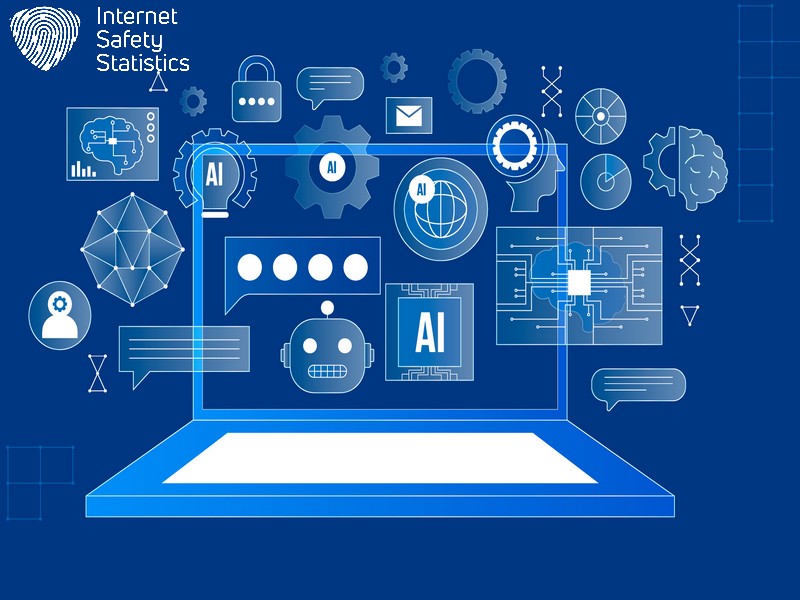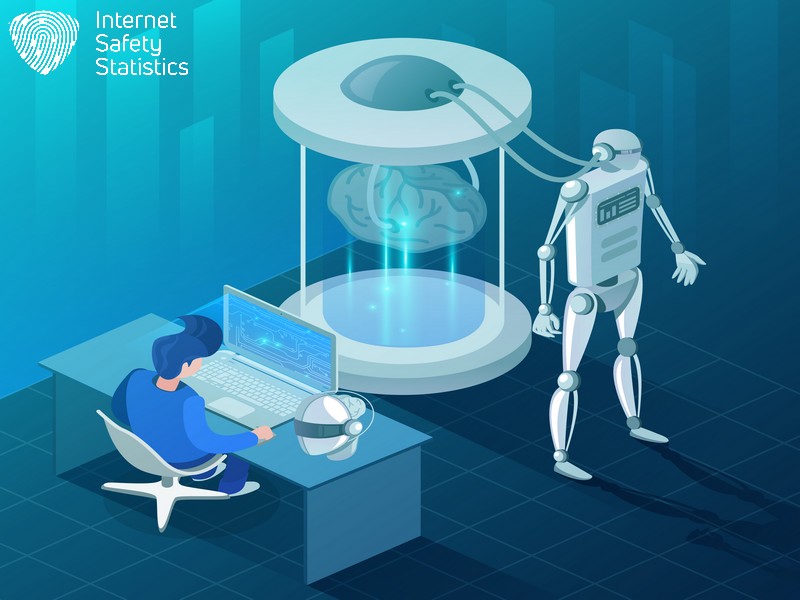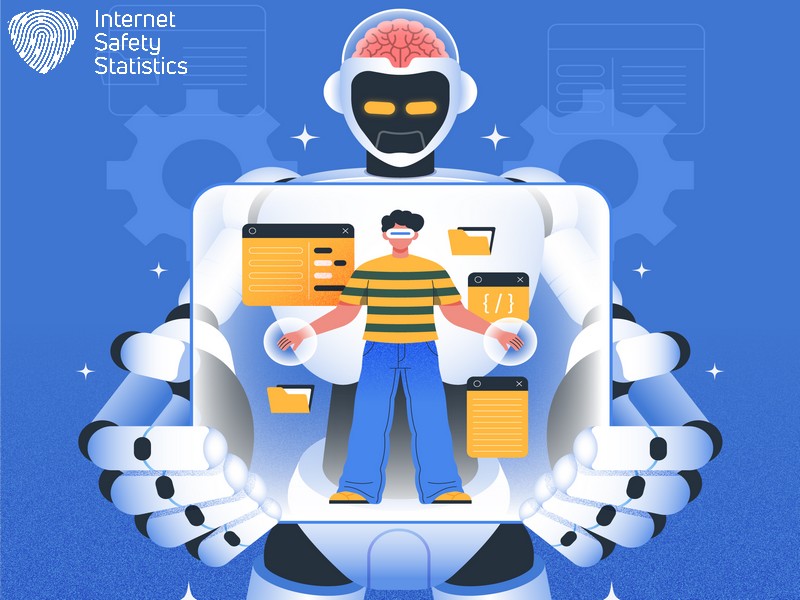
In an age where our lives are increasingly online, protecting our personal space has never been more important. Artificial intelligence is everywhere, from the phone in your pocket to the virtual assistant in your home, and it’s collecting data at every turn. This article will explore how AI impacts online privacy and what steps you can take to safeguard your digital footprint. Keep reading; it’s time we shine a light on this invisible guest.
What is Artificial Intelligence (AI)?
Artificial Intelligence (AI) is the simulation of human intelligence in machines programmed to think, learn, and solve problems. It encompasses various types, including narrow AI focused on specific tasks, general AI, which can handle any intellectual task a human can do, and super AI, which surpasses human capabilities. Additionally, AI relies on big data, machine learning, and deep learning techniques to process information and make decisions.
Types of Artificial Intelligence (Narrow, General, Super)
Artificial intelligence changes the way we handle online privacy. It uses personal information in ways that can significantly affect our privacy rights.
- Narrow AI, also known as Weak AI, focuses on one task. It’s the type of artificial intelligence used in voice assistants and email spam filters. This kind is everywhere, helping you navigate roads, suggest films, or protect your inbox from junk mail. Even though specialised, it must handle personal data securely to maintain online privacy.
- General AI mirrors human cognitive abilities. When this level of artificial intelligence matures, machines will perform any intellectual task a human being can. Imagine a robot that could reason like a person and make decisions based on complex analysis – that’s what this type aims for. With such power comes greater responsibility for data protection and respecting individuals’ privacy interests.
- Super AI exceeds human intelligence and capability. This futuristic form of artificial intelligence is theoretical but poses serious questions about information privacy if it ever becomes a reality. Its ability to process huge amounts of data could lead to profound advancements but also exposes potential risks for privacy breaches and unauthorised access to sensitive information.
Role of Big Data, Machine Learning, and Deep Learning in Artificial Intelligence
Big Data, Machine Learning, and Deep Learning are pivotal in Artificial Intelligence. Big Data provides large volumes of structured and unstructured data for AI systems to process and analyse.
Machine Learning enables artificial intelligence algorithms to learn from this data, identify patterns, and make predictions or decisions based on the information gathered. Deep Learning takes this further by mimicking how the human brain processes information through artificial neural networks, allowing artificial intelligence systems to recognise complex patterns and make more sophisticated decisions.
These technologies are crucial in enabling artificial intelligence to understand and interpret vast amounts of data, ultimately enhancing its ability to perform tasks that were once only achievable by humans. As a result, these advancements have greatly impacted various aspects of our lives, including online privacy and security.
Artificial Intelligence in the Public Sector and its Impact on Privacy

Artificial intelligence in the public sector involves the collection, purpose, and use of personal information, raising concerns about transparency and consent. There is also the potential for discrimination and a need for accountability and governance.
Collection, Purpose, and Use of Personal Information
Artificial intelligence facilitates collecting, analysing, and using personal data for diverse purposes. It enables organisations to compile and process extensive datasets, posing potential risks to privacy and security. It can infer sensitive information such as location, preferences, and habits from various sources, leading to concerns about unauthorised access and usage of personal data.
Data protection laws seek to regulate artificial intelligence systems’ purposeful collection and ethical utilisation of personal information. However, the evolving nature of artificial intelligence magnifies its ability to leverage personal data in ways that may intrude on privacy interests.
Transparency and Consent
Moving from the collection, purpose, and use of personal information to transparency and consent, individuals need to understand how their data is collected and used. Transparency is crucial in building trust between users and organisations leveraging artificial intelligence. Providing clear information about the types of collected data, how it will be processed, and who will access it fosters transparency. It allows individuals to make informed decisions about consenting to using their data.
Consent ensures that individuals have control over their personal information by giving them the power to decide whether or not they want their data to be used for specific purposes.
Potential for Discrimination
Artificial intelligence has the potential to amplify discrimination by making decisions based on biased data. This may result in discriminatory outcomes, especially in hiring, lending, and law enforcement.
For instance, if historical data used to train artificial intelligence systems reflects biases against certain groups, these biases can be perpetuated and lead to unfair treatment of individuals. Therefore, addressing and mitigating these potential discriminatory effects of artificial intelligence is crucial by actively working towards more inclusive and unbiased data sets.
The risk of discrimination is heightened when artificial intelligence algorithms are not transparent or explainable. Without transparency, it becomes challenging to identify instances where bias may be present in decision-making processes.
Accountability and Governance
Accountability and governance are vital in the age of artificial intelligence to ensure the responsible and ethical use of personal data. By implementing robust governance frameworks, organisations must be held accountable for collecting, storing, and processing sensitive information.
This includes clear policies on transparency, consent, and preventing discrimination in AI-powered decision-making processes. Data protection laws ensure accountability and governance standards are met to protect individuals’ privacy rights.
Effective governance enforces ethical guidelines to prevent data breaches while promoting fairness and non-discriminatory practices within artificial intelligence systems. Moreover, it entails establishing mechanisms for oversight and enforcement to hold organisations responsible for handling personal information under the purview of AI technologies.
How AI Impacts Online Privacy
The age of AI presents various privacy challenges, including violating privacy, bias and discrimination, job displacement, and data abuse practices. If you want to learn more about how these challenges impact online privacy, keep reading!
Violation of Privacy
AI can violate privacy by inferring sensitive information, such as a person’s location, preferences, and habits, without consent. This unauthorised access to personal information raises concerns about the ethical use of data.
Organisations leveraging artificial intelligence can collect, store, and process massive amounts of data, impacting individuals’ privacy rights. As artificial intelligence evolves, it magnifies the potential for intruding on privacy interests by using personal information in ways that may not be transparent or ethically sound.
Generative artificial intelligence introduces further worries due to its capability to process personal data and generate potentially sensitive information.
Bias and Discrimination
AI algorithms are susceptible to bias and discrimination, which can perpetuate existing societal inequalities. Personal data processed by artificial intelligence systems might lead to biased decisions in hiring practices or loan approvals, affecting individuals negatively. These biases often stem from historical data that reflect societal prejudices. It is essential to actively address these issues to ensure fair and unbiased outcomes when AI systems are utilised.
Discrimination resulting from artificial intelligence decisions violates privacy rights as it can impact an individual’s opportunities based on inaccurate assessments of their personal information. Regulatory measures must impose strict guidelines for developing and deploying artificial intelligence technologies to mitigate discriminatory outcomes.
Job Displacement
AI algorithms have been known to lead to job displacement, primarily in industries where repetitive tasks are automated. This transition can potentially impact a wide range of workers, from factory to office workers.
The introduction of artificial intelligence technologies often results in the automation of specific roles, leading to human job losses and shifts in employment patterns. As artificial intelligence evolves, individuals across various sectors must adapt their skills and embrace opportunities for reskilling and upskilling.
The shift towards automation by AI algorithms can result in significant changes in the labour market landscape. Job displacement due to technological advancements raises concerns about workforce adjustments and highlights the necessity for retraining programs that cater to emerging job demands.
Data Abuse Practices
AI algorithms have the potential to be misused, leading to data abuse practices that compromise online privacy. Companies may exploit AI-driven technologies to gather and analyse personal information without consent, violating individuals’ privacy rights and increasing the risk of unauthorised access to sensitive data.
This can result in online tracking, with organisations using personal data for targeted advertising or other purposes without users’ knowledge or permission. The rise of artificial intelligence has also amplified concerns about data security, as the technology’s ability to process vast amounts of data increases the likelihood of breaches and misuse.
With artificial intelligence algorithms susceptible to exploitation, ensuring robust data security measures is essential for safeguarding online privacy. Internet users and office workers must remain informed about potential data abuse practices facilitated by artificial intelligence technologies and take proactive steps to protect their personal information from unauthorised access and misuse.
Real-life Examples of AI-related Privacy Concerns

Google’s location tracking, personal experiences with AI-powered recommendations, and the use of artificial intelligence in law enforcement and hiring & recruitment are just a few real-life examples that highlight significant privacy concerns related to artificial intelligence. These examples show how artificial intelligence can impact individual privacy in everyday life.
Google’s Location Tracking
Google’s location tracking has raised significant privacy concerns as it allows the company to infer users’ precise locations and movements. This raised concerns about unauthorized access to personal information, impacting privacy rights significantly.
The technology behind Google’s location tracking enables the collection and storage of massive amounts of data, posing risks of potential data abuse practices. For instance, this can lead to disclosing sensitive information without consent, highlighting the ethical challenges surrounding AI-driven location tracking.
AI-powered location tracking introduces privacy concerns due to its ability to process personal data and infer potentially sensitive information. These implications have led to an intensified debate on the ethical use of personal information and underscored the need for robust regulations and accountability measures to effectively protect individuals’ online privacy.
Personal Experience with AI-Powered Recommendations
Many of us have had the experience of receiving eerily accurate recommendations from online platforms. For instance, you might shop for a specific item, only to see it pop up as an advertisement on your social media feed shortly after. This phenomenon is driven by AI-powered recommendation systems that analyse our browsing and purchasing habits to predict and suggest products or content tailored to our interests.
Whether movie suggestions on streaming services or personalised product recommendations on e-commerce sites, artificial intelligence algorithms constantly work behind the scenes to understand and cater to our preferences.
As artificial intelligence continues to evolve, it has become adept at curating personalised experiences based on our behaviours and interactions online. These tailored recommendations raise important questions about privacy and data usage, prompting concerns about how much control we have over the personal information collected by these algorithms.
Use of Artificial Intelligence in Law Enforcement
Artificial intelligence in law enforcement has raised concerns about privacy and data protection. It has enabled facial recognition technology, biometric surveillance, and predictive policing. The potential for bias in artificial intelligence algorithms law enforcement agencies use has sparked debates surrounding privacy issues. Personal information collected through these technologies can be misused, raising questions about transparency and accountability in law enforcement practices.
Artificial intelligence challenges online privacy as it allows for the mass collection of personal data without individuals’ consent. This has prompted discussions around the ethical implications of using artificial intelligence in law enforcement and the need for robust regulation to safeguard privacy rights.
Use of Artificial Intelligence in Hiring and Recruitment
Artificial intelligence is increasingly utilised in the hiring and recruitment processes, revolutionising how companies identify and select potential candidates. Artificial intelligence algorithms can analyse large volumes of data to match job requirements with candidate profiles efficiently.
This has led to more accurate shortlisting of candidates based on their skills, experiences, and qualifications. Moreover, AI-powered tools enable businesses to automate routine tasks such as resume screening and initial interviews, saving employers and job seekers time.
The use of artificial intelligence in hiring has raised concerns about potential biases in decision-making processes that could impact diversity and inclusion in the workplace. Additionally, there are worries about the ethical collection and usage of personal information during recruitment.
As technology advances, it’s crucial to ensure that artificial intelligence applications in hiring prioritise fairness, transparency, and respect for individuals’ privacy rights.
Solutions to Overcome Privacy Challenges in the Age of AI
Our solutions to overcoming possible challenges regarding the effect of artificial intelligence on online privacy discuss two main elements. Global Approaches to Protecting Privacy, resulting in collaboration with international organisations and governments to establish global standards for the ethical use of artificial intelligence. The second element is the need for regulation, which is implementing strict regulations and laws to govern personal data collection, storage, and usage in artificial intelligence systems.
Global Approaches to Protecting Privacy
Global approaches, such as enacting stringent data protection laws and regulations, are essential to protect privacy. These measures ensure that organisations using artificial intelligence handle personal information ethically and transparently.
Promoting awareness and education about privacy rights also empowers individuals to make informed decisions about their online activities. Collaborative efforts among governments, technology companies, and advocacy groups also play a crucial role in developing standards for protecting privacy in the digital age. Furthermore, fostering international cooperation to address cross-border data flows and ensuring consistent enforcement of privacy regulations is vital in safeguarding individuals’ personal information.
Need for Regulation
Regulation is essential to protect personal information in the age of artificial intelligence. Data privacy laws are crucial to safeguard individuals from unauthorised access and use of their sensitive data. These regulations ensure that organisations collect, store, and process personal information ethically and transparently. They also establish accountability for the governance and responsible use of artificial intelligence technologies, addressing concerns about potential discrimination and bias.
Moreover, regulations can empower consumers by giving them more control over how their data is used, fostering a safer online environment.
Importance of Data Security and Encryption
Data security and encryption are crucial to safeguarding personal information in the age of advanced technology and increasing online interactions. Parents, office workers, and internet users must understand the significance of protecting sensitive data from unauthorised access. Data breaches can have devastating consequences, including identity theft and financial loss. Robust data security measures are essential in preventing such incidents.
Businesses also play a vital role in maintaining customer trust by implementing strong encryption protocols to protect confidential information. Encryption transforms data into an unreadable format for unauthorised individuals, adding an extra layer of security to prevent malicious exploitation.
Role of Consumers
Transitioning from the importance of data security and encryption to the role of consumers, it becomes evident that individuals hold a significant position in safeguarding their privacy.
As internet users and office workers navigate an ever-evolving digital landscape, they play a crucial role in understanding how artificial intelligence affects their personal information. Consumers can create a more secure environment by actively engaging with privacy settings, being cautious about sharing sensitive data online, and advocating for transparent artificial intelligence practices.
Parents should educate themselves and their children on best practices for online safety, promoting responsible use of technology while encouraging open conversations about privacy concerns.
Office workers can take proactive steps by staying informed about company policies regarding AI-driven tools and challenging potential infringements on their privacy rights. Internet users can exercise discretion when providing consent for data collection and advocate for clear opt-out options where necessary.
Possibility of Decentralised AI Technologies
Decentralised AI technologies offer a promising solution to privacy concerns. These technologies distribute artificial intelligence processing across multiple devices, reducing the risk of unauthorised access to personal information.
With decentralisation, individuals can maintain greater control over their data, enhancing transparency and accountability in artificial intelligence systems. This approach aligns with the need for ethical collection and usage of personal information by artificial intelligence, providing a potential safeguard against privacy violations.
The evolution of decentralised artificial intelligence technologies holds significant promise for mitigating privacy risks associated with centralised data processing. By incorporating these advancements into our digital landscape, we can cultivate a more secure and transparent environment for data handling while responsibly harnessing artificial intelligence’s power.
Future of Artificial Intelligence and Online Privacy

As artificial intelligence advances, the future of online privacy will be impacted by emerging technologies such as quantum computing and the implementation of zero-trust security measures. There is an ongoing debate on the benefits and risks of artificial intelligence for privacy, with concerns surrounding data protection, surveillance, and personal autonomy in the digital age.
The Impact of Quantum Computing
Quantum computing poses a significant impact on online privacy, as it has the potential to enhance both the security and vulnerability of personal data. Quantum computers can quickly process vast amounts of information, revolutionising encryption methods to safeguard sensitive data.
However, this capability threatens current encryption techniques, potentially rendering them obsolete. This advancement raises concerns about the future ability to protect private information from unauthorised access and exploitation.
The emergence of quantum computing presents a double-edged sword for online privacy. On the one hand, it promises enhanced security measures through advanced encryption techniques; on the other, it challenges existing safeguards by potentially breaching current security protocols.
The Role of Zero Trust in Protecting Privacy
Zero Trust plays a crucial role in safeguarding privacy in the digital age. By assuming that every user and device, both inside and outside the network, is untrustworthy until proven otherwise, Zero Trust ensures robust protection against unauthorized access to sensitive information.
This proactive approach aligns with the growing concerns over data privacy and security, particularly as artificial intelligence technology advances. Implementing Zero Trust principles empowers organizations to mitigate potential risks associated with AI’s ability to infer sensitive information and process personal data.
Furthermore, zero-trust frameworks are essential for maintaining transparency and control over the collection, storage, and usage of personal information by artificial intelligence systems. As individuals increasingly rely on online platforms for various services, such as healthcare or financial transactions, fostering a culture of zero trust can help prevent unauthorized access to private data.
Debate on the Benefits and Risks of Artificial Intelligence
The ongoing debate surrounding the benefits and risks of artificial intelligence continues to engage various stakeholders. Parents, office workers, and internet users weigh the advantages of artificial intelligence, such as improved efficiency and innovation, against the potential risks it poses to online privacy. As artificial intelligence becomes more prevalent daily, understanding its consequences on privacy and data security remains crucial for individuals navigating an increasingly digital world.
Concerns about personal information protection balance AI’s potential to transform industries and enhance user experiences. Whether it’s harnessing artificial intelligence for personalised recommendations or safeguarding against unauthorised access to sensitive details, discussions around the ethical implementation of artificial intelligence are essential in shaping future policies and practices.
As artificial intelligence continues to evolve, it magnifies the potential to use personal information in ways that can intrude on privacy interests. Protecting privacy in this age of technology is crucial for ethical decision-making and safeguarding individuals’ data. Global approaches, regulation, data security, and consumer awareness play pivotal roles in mitigating the impact of artificial intelligence on online privacy. Embracing decentralised AI technologies while keeping an eye on quantum computing’s influence and debating the benefits versus risks will shape the future landscape of artificial intelligence and online privacy.
FAQs
1. What is artificial intelligence doing to my online privacy?
Artificial intelligence may analyse your online behaviour and personal data, which could affect your privacy.
2. Can AI keep my information safe on the internet?
Artificial intelligence can potentially enhance cybersecurity measures, protecting your information from unauthorised access.
3. Will AI share my private details without me knowing?
Certain artificial intelligence can be programmed to handle sensitive information carefully, but its effectiveness depends on the design and regulations in place. systems might share data with other applications or services, sometimes without consent.
4. Can I control what artificial intelligence knows about me online?
You have some control over your data by managing privacy settings and being selective about what you share online.
5. Is artificial intelligence smart enough to handle my sensitive information carefully?
Artificial intelligence can be programmed to handle sensitive information carefully, but its effectiveness depends on the design and regulations in place.
